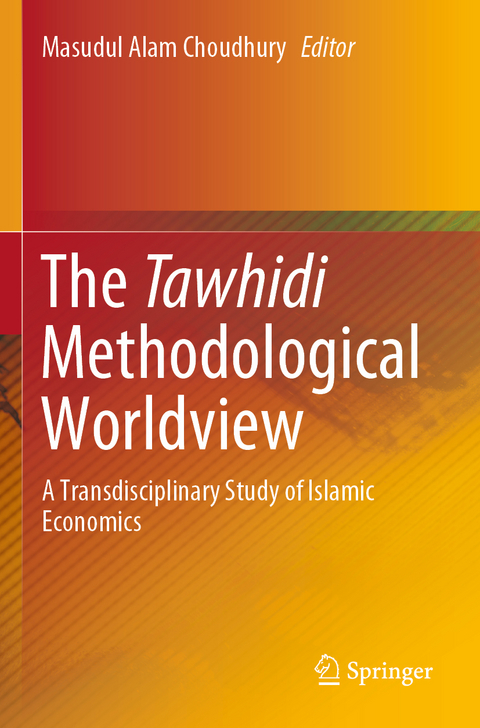
The Tawhidi Methodological Worldview
Springer Verlag, Singapore
978-981-13-6587-4 (ISBN)
Professor Masudul Alam Choudhury is one of a handful of academic scholars in the field of Islamic studies with a focus on Islamic economics and finance. His work has been highly recognised in both Western and Muslim academic circles. Professor Choudhury obtained his Ph.D. in the field of Human Capital Theory and Economic Growth from the University of Toronto. He is the first academic in his field to address the original methodology of Tawhid as ontological law in the development of a Theory of Meta-Science. Professor Choudhury is the International Chair in the Postgraduate Program in Islamic Economics and Finance at Trisakti University in Jakarta, Indonesia. He teaches and supervises doctoral students, and researches and publishes in the areas of Islamic socio-scientific methodology, shari’ah and economics, and policy-theoretic applications using these foundational areas of Islamic studies. He is a regular Summer Visiting Professor in the Social Economy Center of the OntarioInstitute for Studies in Education, University of Toronto. Contributions by:Dr. Ari Pratiwi, Postgraduate Program in Islamic Economics and Finance, Faculty of Economics, Trisakti University and Graduate Program of Human Resource Development, Paramadina University, Jakarta, Indonesia. Dr. Lily Rahmawati Harahap, Faculty of Economics, IBA University Palembang, South Sumetera, Indonesia. Professor Dr. Mohammad Shahadat Hossain, Department of Computer Science, Chittagong University, Bangladesh. Professor Dr. Saeed Al-Muharrami, Department of Economics and Finance, College of Economics and Political Science, Sultan Qaboos University, Muscat, Sultanate of Oman.
PART I: Theory of Tawhidi String Relation (TSR).-CHAPTER 1.Introduction.- CHAPTER 2.Establishing Tawhidi String Relation as the Epistemic Foundation of Tawhidi Methodological Worldview.- CHAPTER 3.Tawhidi Structure of the Participatory World-System.- CHAPTER 4.Wellbeing Objective Criterion (MASLAHA).- CHAPTER 5.Examples of Dynamic Learning Shifts in Simulated Computational Generalized Equilibrium Systems.- CHAPTER 6.An Observation on the TSR versus Shari'ah Models of Asset Valuation.- CHAPTER 7.Structure of Participatory Institution According to Tawhidi Unitary Worldview and Conversely.- CHAPTER 8.Science, Society, and Technology in Institutionalism According to TSR Contra Other.- CHAPTER 9.Winding up the TSR Lectures of PART I.- PART II.Selected Abstracto-Empirical Applications of TSR.-Introduction to PART II.- CHAPTER 10.Empirical Method (Formalism) For Islamic Social andCharitable Financing Derived from the Epistemic Unity of Knowledge and the Wellbeing Objective Function.- CHAPTER 11.Empirical Results of Application of Tawhidi Methodology to Waqf (Perpetual Charity as Endowment) in Wellbeing Function.- CHAPTER 12.The Contrast Between the Law of Tawhid and the ideas of Shari'ah-Compliance and Maqasid As-Shari'ah and its extension: An Empirical Work.- CHAPTER 13.Circular Causation for Popiulation and Economic Growth and Development Issues of Bangladesh.- CHAPTER 14.Society's Attitude to Pay Zakat Relating to Employment and Income Variables Seen From Tawhidi Perspective in South SumateraA Cross Sectional Study Based on Survey.- CHAPTER 15.Omanization (Development Tranformation of the Sultanate of Oman) as an Economic and Social Wellbeing Goal: Application of TSR Circular Causation Method.- CHAPTER 16. Conclusion.- GRAPHS.- APPENDIXES. REFERENCES.- SUBJECT INDEX.
| Erscheinungsdatum | 08.08.2020 |
|---|---|
| Zusatzinfo | 41 Illustrations, color; 9 Illustrations, black and white; XXXVII, 228 p. 50 illus., 41 illus. in color. |
| Verlagsort | Singapore |
| Sprache | englisch |
| Maße | 155 x 235 mm |
| Themenwelt | Geisteswissenschaften ► Religion / Theologie ► Islam |
| Sozialwissenschaften ► Soziologie | |
| Wirtschaft ► Betriebswirtschaft / Management ► Finanzierung | |
| Wirtschaft ► Volkswirtschaftslehre ► Finanzwissenschaft | |
| Schlagworte | Belief-induced knowledge-parameter • Computational generalized equilibrium systems • Economic well-being • Islamic economics • Islamic Finance • Monotheism and science • Monotheism as law • Quranic methodology • Qur’anic monotheism • Shariah Law • Shariah models of asset valuation • Tawhidi Methodological Worldview • Tawhidi methodology • Tawhidi String Relation • Unity of knowldege |
| ISBN-10 | 981-13-6587-3 / 9811365873 |
| ISBN-13 | 978-981-13-6587-4 / 9789811365874 |
| Zustand | Neuware |
| Informationen gemäß Produktsicherheitsverordnung (GPSR) | |
| Haben Sie eine Frage zum Produkt? |
aus dem Bereich


